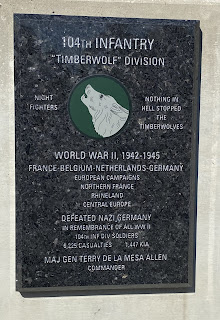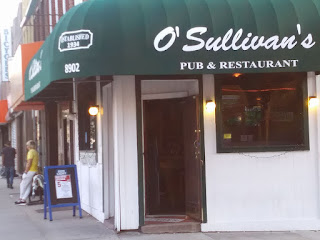Nothing in Hell
The group is made up the sons, daughters, families, and friends of my father’s army unit, The Timberwolves, who fought in Europe during World War II.
Let me say right up front that I had a blast.
I met such wonderful people, heard fantastic stories, did some sightseeing around our nation’s capital—including a nighttime ride around town--and spoke with a 98-year-old veteran who had attended the conference.
As usual, I hemmed and hawed about making the trip. It’s too much money, I have other projects to work on, I need to clean up my apartment—you know, the usual crap I put myself through.
Well, I’m happy to report that I ignored all those irrational fears, booked a hotel room and Amtraked my butt down to Washington. And I’m so happy that I did.
My dad’s unit, whose motto was “Nothing in Hell can stop The Timberwolves,” landed in France in 1944 and liberated the Dora-Mittelbau concentration camp a year later.
I’m working on a novel that includes scenes that take place during World War II, and I thought that connecting with this group would be helpful for my project and give me a more complete picture of my dad’s war experiences.
I grew up listening to my father’s war stories and I never grew tired of hearing about his exploits—no matter how many times he repeated them.
Ten-hut!
Over time, the people he spoke about—guys like Benny Tornetta, Tiger Ryan from Chicago, and The Swede—became real to me.
He told me about training in Arizona, described nighttime battles, where, as he said, “the shit was flying” and the horrors of artillery attacks where he dug in the ground with his bare hands in a desperate effort to find shelter.
I’m older now and I can see how these events must have done lasting damage to his psyche.
He saw men killed and horribly injured, listened as they screamed for their mothers. My father and some of his buddies had made plans to get together after the war, but he was the only one to come home.
You can’t just walk away from these nightmares, but treatment for returning soldiers seems to have been very primitive back then, when GIs were expected to put down the rifle and pick up the briefcase.I wish I had a better understanding of my father’s suffering while he was still alive, but what does a child know of war?
The highlight of the trip was a memorial service that included the lighting and extinguishing of altar candles.
I proudly accepted an offer to participate in this ceremony where I was called upon to put out one of the candles and then salute.
Now my dad often complained about inaccuracies in war movies, such as soldiers who made impossible shots, and hand grenades powerful enough to take down a mountain.
But one of his biggest pet peeves was the sloppy salutes he saw in so many films and TV shows. I guess after all that time doing the real thing in a real war, my father had no patience with actors who couldn’t get this basic gesture right.
“That’s a pretty half-assed salute,” he’d sneer.
When my name was called, I stepped up to the altar, picked up the snuffer, extinguished the candle, and did my very best to execute a proper salute.
Thank you for your service, Dad.





Comments
I’m sure you did your father proud with your salute.
My father did not serve in the military, but worked as a civilian at the Bremertown Naval Shipyard. I too am proud of his "service."
Hi, Dorothy. I had a great time attending this event and I do have a greater understanding and appreciation of my father's service.
One of the people attending the event told us his father was killed in the war--when he was two years old. That really had an impact on me.
Hey, Bijoux!
Thank you so much! I enjoyed DC as well, as it has so much in the way of museums and galleries and monuments--it's an amazing place.
That's quite a story about your uncle--and that CD is a tremendous find! I hope you do get to Arlington to pay your respects to this hero.
Take care!